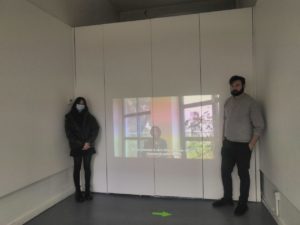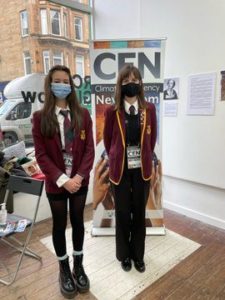INTERVIEW: Expert Dr Dominic Hinde
Dr Dominic Hinde is a Lecturer in Sociology attached to the Glasgow Media Group and teaches on the MSc Media, Communications and International Journalism.
He has worked with a range of Professors from around the world to produce a short documentary called Adaption – Three Stories From a Changing Planet. We had the opportunity to watch this documentary at RCC Glasgow*.

*As quoted from their website, ‘RCC is a pop-up exhibition running in parallel with the 2021 United Nations Climate Change Conference in Glasgow from 1-12 November 2021’. You can access their website following this link: https://rccglasgow.com/
In the interview, we asked Dominic Hinde a series of climate questions related to his work in Media and Communications.
The questions:
-
What interested you to get into this sector?
A few years ago, Dominic was given funding by the Government to do a PhD. During his studies, he wrote about representations of the environment in the media. He had also worked as a journalist around Northern Europe, South America and the United States. Throughout this time, he began to discover his passion for the environment, global politics and global media were coming together. In his work, he looks at the way in which the media portrays and understands global problems, and how they can change the way the media works to do this better. In this, he is combining his professional work with his drive to tackle climate change.
-
What brought you and the three researchers together (what was the defining moment)?
 Dominic is part of a network of people who work and research in Universities across different subjects. These people come from different parts of the world and meet together (virtually or in person) to find ways in which they can work together to uncover some of the challenges we face as a result of climate change.
Dominic is part of a network of people who work and research in Universities across different subjects. These people come from different parts of the world and meet together (virtually or in person) to find ways in which they can work together to uncover some of the challenges we face as a result of climate change.
The idea of the film was that three researchers from the Global South would be given the opportunity to tell their own stories. These researchers are from Chile, India, Tanzania and Kenya – areas that suffer greatly due to climate change. The film highlighted their struggles and what they need from richer countries to help stop its effects.
-
What do you hope the showing of your film will achieve?
Many documentaries take things out of context in order to create a strong story. This film was to present people in their own words. Although the film has been edited together, nothing has been done to change their stories or opinions.
In terms of an achievement in Glasgow, the film aims to bring people in to learn about what is happening as a result of climate change in other countries. It’s about putting ourselves in someone else’s shoes. The worst aspects of climate change are being felt by people in places very far from here, so by doing the film, these stories are being brought closer to show the public that this already our reality.
‘Climate change is not something that is going to happen, it is something that is happening right now and is not very far away from us.’
-
What would you like COP26 to achieve?
 Dominic explained to us that he would like COP26 to achieve legal agreements that lead to keeping global temperatures under 1.5 degrees celsius. He explained that this is important as if we go over this temperature, things start to get very bad very quickly. Although lots of agreements are already in place, countries have missed their targets. Even in Scotland where we have made progress with renewable energy and cutting out carbon, we’ve missed our target several years in a row as we haven’t been able to put the necessary politics in place.
Dominic explained to us that he would like COP26 to achieve legal agreements that lead to keeping global temperatures under 1.5 degrees celsius. He explained that this is important as if we go over this temperature, things start to get very bad very quickly. Although lots of agreements are already in place, countries have missed their targets. Even in Scotland where we have made progress with renewable energy and cutting out carbon, we’ve missed our target several years in a row as we haven’t been able to put the necessary politics in place.
-
Are global summits the most efficient way to deal with the climate crisis?
Global summits are an important part when it comes to dealing with the climate crisis. If we didn’t have summits like COP26 the world would really struggle to come together. The United Nations however, is the most important factor. Without them there would be no COP. They allow every country, rich or poor, to get equal representation.
The big problem is that we need a large scale reorganisation of the way we run the world economy, our local economies, and the way we live.The summits are a part of this – the Governments have to do their bit, and we have to do our bit. We have to build connections with the rest of the world and not just rely on our leaders. This is a global challenge, not a competition.
‘What we’ve seen with climate change is instead of people competing to give things or to win things, it actually requires offering things up and sacrificing things you might already have. And that requires a lot of humility and modesty, and that’s not something many politicians actually have.’
We would like to thank Dominic Hinde for letting us interview him and for showing us his insightful documentary. We would encourage everyone to check it out at RCC Glasgow.
By Stephanie Anderson and Mikayla Bowles

